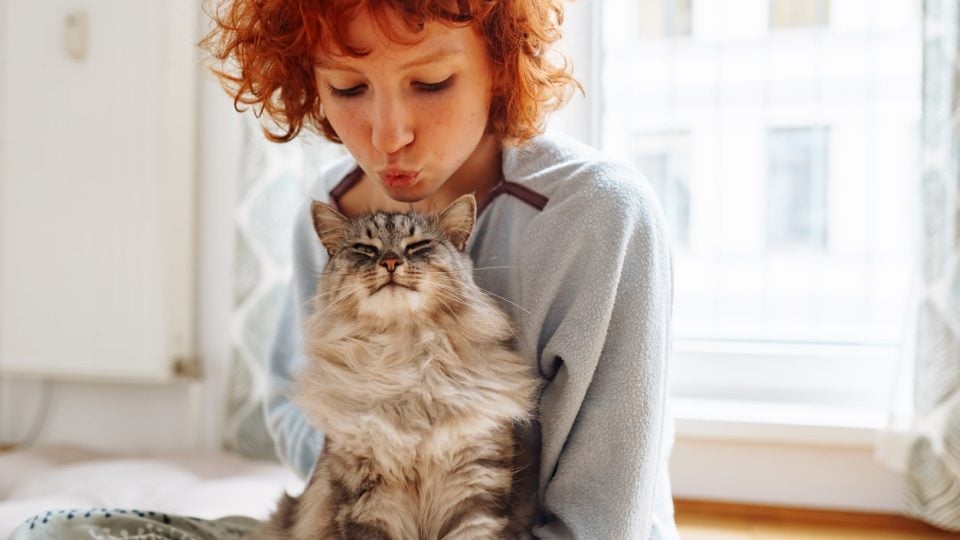Thanks to better care from vets, improved cat food, and more people understanding how to create a safe and fun home for cats, cats live longer than ever. Indoor cats usually live between 12 and 18 years, and some can even live up to 20 years, according to Dr. Neus Torrent Ample, a cat nutrition expert at Outdoor Bengal. In comparison, outdoor cats often live around five years.
As cat parents, it is important to know how small choices and everyday actions can affect your cat’s lifespan. Cats that live the longest have a comfortable home, a healthy diet, and a balanced lifestyle.
Here’s what top vets say about how long cats live and how you can help them live longer.
What Factors Affect How Long Cats Live?
Two of the biggest things that affect how long cats live are whether they are indoor or outdoor cats and whether they live alone or with other cats.
Indoor vs. outdoor cats
Outdoor cats face many dangers, making their average lifespan much shorter than indoor cats. Dr. Anne Romeo, a lead vet at CityVet Southtown, and Dr. Torrent Ample both agree that outdoor cats usually live about five years. Several things can shorten an outdoor cat’s life:
- Getting hit by cars or other vehicles
- Attacks from wild animals
- Injuries from accidents
- Fights with other outdoor cats
- Accidental poisoning
- Exposure to poisons
- Infections from parasites
- Diseases like FIV and FeLV
Living alone vs. living with other cats
Having a pair of cats or adding a cat friend later in life can help cats live longer because they get:
- More exercise, which helps them stay fit
- Emotional connections with other cats can reduce separation anxiety
- Engaging in natural cat behaviors like playing and pouncing
- Mental stimulation, which keeps them entertained and less bored
However, Dr. Grant Little, a Veterinarian Expert on JustAnswer, says too many cats in one home can be bad for them because of:
- Higher risk of spreading diseases
- Fighting for food and resources
- Aggression and injuries among cats
- Less attention from the vet
Diet
A bad diet can make cats overweight and more likely to get diseases that shorten their lifespan. Cats need meat-based diets because they are obligate carnivores.
It’s best to avoid low-quality kibble and wet foods with ingredients like cheese and gravy.
Which Cat Breeds Live the Longest?
There isn’t clear data on how long different cat breeds live. However, Dr. Torrent Ample says, “Purebred cats are more prone to inherited genetic health problems due to selective breeding practices, which can lead to a shorter average lifespan.” Mixed-breed cats often live longer.
Some cat breeds with shorter lifespans include:
What Health Problems Shorten a Cat’s Life?
Dr. Preston Turano, a veterinary advisor at Felix Cat Insurance, says cats have four recognized life stages. The health problems that can shorten a cat’s life depend on their life stage.
Kittens: Birth to 1 year old
Kittens are young and have developing immune systems, so they can get sick easily. Dr. Turano and Dr. Little says lifespan-shortening health problems in kittens include:
- Bacterial infections
- Ringworm
- Feline herpesvirus (FHV)
- Viral infections
- Heartworm
- Flea infestations
- Heart defects
- Neurological disorders like “wobbly cat syndrome”
- Hip misalignment or dysplasia
- Blood flow defects
- Physical defects like cleft palate or eye and eyelid deformities
Young adults: 1 to 6 years old & Mature adults 7 to 10 years old
Dr. Little says young adult and adult cats don’t have as many obvious health issues as kittens or seniors. However, they might develop health problems like:
- Weight gain and obesity
- Digestive system and GI problems
- Pancreatitis
- Diabetes
- Periodontitis, gingivitis, and other dental diseases
- Tooth abscesses and tooth resorption
Seniors: 10 years and older
Dr. Little and Dr. Turano say that senior cats can get diseases and illnesses such as:
- Liver problems
- Heart problems and irregular heartbeat
- Heart disease
- Kidney disease
- Hyperthyroidism
- Diabetes
- Intestinal diseases
- Tumors
- Cancers

iStock/Liam Bell
How Can You Help Your Cat Live Longer?
Dr. Jana Bryant, a lead vet at CityVet Coppell, suggests being proactive to help your cat live longer. Here are five ways to do that:
1. See the vet regularly
Dr. Bryant says that regular vet visits are important for a long cat life. Generally, cats should see a vet once a year. More frequent visits and lab work are advisable for cats with chronic illnesses or in late adulthood.
Dr. Little also mentions the importance of diagnostic testing, such as blood work, urine samples, fecal samples, and chest and abdominal X-rays. Pet insurance can help make regular checkups more affordable.
2. Keep them entertained
Cats thrive when they’re actively using their brains and engaging their instincts. Provide the following:
- Predatory play toys
- Food puzzles
- Lick mats and slow feeders
- Window perches or secure catios
- Cardboard boxes
3. Create a friendly environment
A cat-friendly environment can boost your cat’s happiness and health while reducing the risk of diseases. Small changes include:
- The proper number of litter boxes
- Cat trees and shelves
- Several different sizes, shapes, and material scratching posts in multiple areas and rooms
- Cat caves and cozy cat beds
- Feline pheromone diffusers
- Cat-safe plants and greens like cat grass and catnip plants
4. Feed them a healthy diet
Dr. Torrent Ample recommends a diet of high-quality meats with omega-6 and omega-3 fatty acids to meet cats’ needs. Hydration is also important to prevent kidney and urinary problems.
Before making any diet changes, talk to a vet to ensure the diet is complete and balanced.



